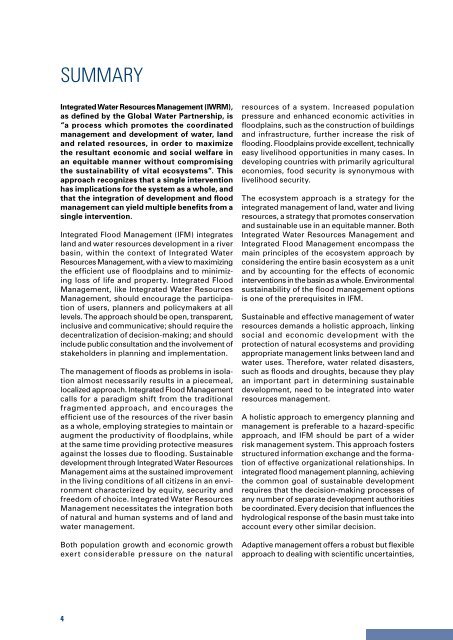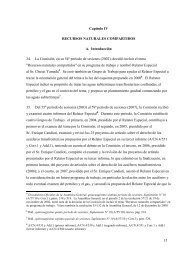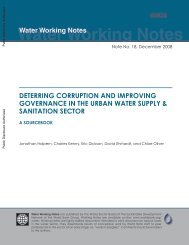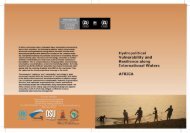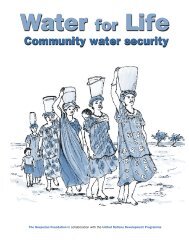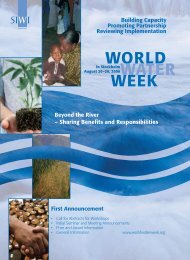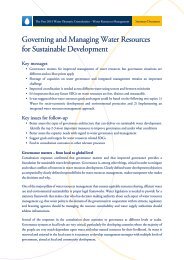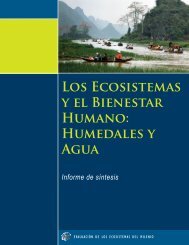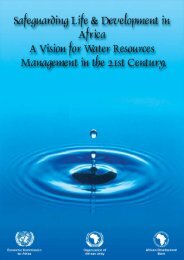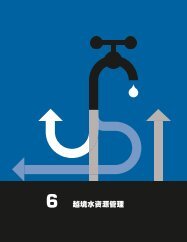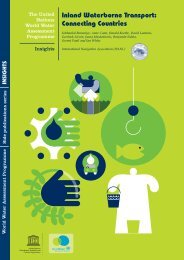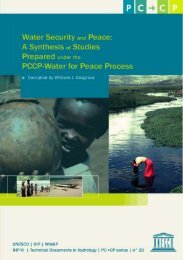Integrated Flood Management-Concept Paper.pdf - APFM
Integrated Flood Management-Concept Paper.pdf - APFM
Integrated Flood Management-Concept Paper.pdf - APFM
Create successful ePaper yourself
Turn your PDF publications into a flip-book with our unique Google optimized e-Paper software.
Summary<br />
<strong>Integrated</strong> Water Resources <strong>Management</strong> (IWRM),<br />
as defined by the Global Water Partnership, is<br />
“a process which promotes the coordinated<br />
management and development of water, land<br />
and related resources, in order to maximize<br />
the resultant economic and social welfare in<br />
an equitable manner without compromising<br />
the sustainability of vital ecosystems”. This<br />
approach recognizes that a single intervention<br />
has implications for the system as a whole, and<br />
that the integration of development and flood<br />
management can yield multiple benefits from a<br />
single intervention.<br />
<strong>Integrated</strong> <strong>Flood</strong> <strong>Management</strong> (IFM) integrates<br />
land and water resources development in a river<br />
basin, within the context of <strong>Integrated</strong> Water<br />
Resources <strong>Management</strong>, with a view to maximizing<br />
the efficient use of floodplains and to minimizing<br />
loss of life and property. <strong>Integrated</strong> <strong>Flood</strong><br />
<strong>Management</strong>, like <strong>Integrated</strong> Water Resources<br />
<strong>Management</strong>, should encourage the participation<br />
of users, planners and policymakers at all<br />
levels. The approach should be open, transparent,<br />
inclusive and communicative; should require the<br />
decentralization of decision-making; and should<br />
include public consultation and the involvement of<br />
stakeholders in planning and implementation.<br />
The management of floods as problems in isolation<br />
almost necessarily results in a piecemeal,<br />
localized approach. <strong>Integrated</strong> <strong>Flood</strong> <strong>Management</strong><br />
calls for a paradigm shift from the traditional<br />
fragmented approach, and encourages the<br />
efficient use of the resources of the river basin<br />
as a whole, employing strategies to maintain or<br />
augment the productivity of floodplains, while<br />
at the same time providing protective measures<br />
against the losses due to flooding. Sustainable<br />
development through <strong>Integrated</strong> Water Resources<br />
<strong>Management</strong> aims at the sustained improvement<br />
in the living conditions of all citizens in an environment<br />
characterized by equity, security and<br />
freedom of choice. <strong>Integrated</strong> Water Resources<br />
<strong>Management</strong> necessitates the integration both<br />
of natural and human systems and of land and<br />
water management.<br />
Both population growth and economic growth<br />
exert considerable pressure on the natural<br />
resources of a system. Increased population<br />
pressure and enhanced economic activities in<br />
floodplains, such as the construction of buildings<br />
and infrastructure, further increase the risk of<br />
flooding. <strong>Flood</strong>plains provide excellent, technically<br />
easy livelihood opportunities in many cases. In<br />
developing countries with primarily agricultural<br />
economies, food security is synonymous with<br />
livelihood security.<br />
The ecosystem approach is a strategy for the<br />
integrated management of land, water and living<br />
resources, a strategy that promotes conservation<br />
and sustainable use in an equitable manner. Both<br />
<strong>Integrated</strong> Water Resources <strong>Management</strong> and<br />
<strong>Integrated</strong> <strong>Flood</strong> <strong>Management</strong> encompass the<br />
main principles of the ecosystem approach by<br />
considering the entire basin ecosystem as a unit<br />
and by accounting for the effects of economic<br />
interventions in the basin as a whole. Environmental<br />
sustainability of the flood management options<br />
is one of the prerequisites in IFM.<br />
Sustainable and effective management of water<br />
resources demands a holistic approach, linking<br />
social and economic development with the<br />
protection of natural ecosystems and providing<br />
appropriate management links between land and<br />
water uses. Therefore, water related disasters,<br />
such as floods and droughts, because they play<br />
an important part in determining sustainable<br />
development, need to be integrated into water<br />
resources management.<br />
A holistic approach to emergency planning and<br />
management is preferable to a hazard-specific<br />
approach, and IFM should be part of a wider<br />
risk management system. This approach fosters<br />
structured information exchange and the formation<br />
of effective organizational relationships. In<br />
integrated flood management planning, achieving<br />
the common goal of sustainable development<br />
requires that the decision-making processes of<br />
any number of separate development authorities<br />
be coordinated. Every decision that influences the<br />
hydrological response of the basin must take into<br />
account every other similar decision.<br />
Adaptive management offers a robust but flexible<br />
approach to dealing with scientific uncertainties,


